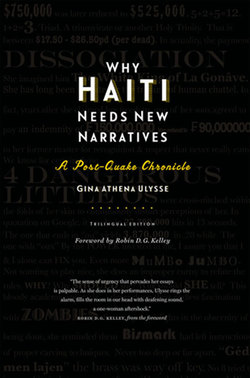Читать книгу Why Haiti Needs New Narratives - Gina Athena Ulysse - Страница 25
На сайте Литреса книга снята с продажи.
Оглавление13
Haiti’s Solidarity with Angels
August 1, 2010 / e-misférica
Sometimes I joke that if Mother Teresa had been the president of Haiti, she too would have become corrupt. After all, she would have been surrounded by fraudulence. All the key players in Haitian affairs—the United States, international financial institutions, the United Nations, and the Haitian government—unevenly partake in imperialist projects, diplomatic and spy games, and exploits of all kinds for the recirculation of capital. Disrespectful? Maybe. Sacrilegious? No.
Part shock factor, part common sense, part frustration. An ill-fitted shout-out to Bourdieu and Gramsci. An attempt to press the exigency of recognizing that those issues, which have continually compromised the republic, must be understood as structural and should be articulated in terms of the reproduction of structures. At the same time, the comment feeds a rebellious need to flip the script on icons and symbols (living or dead) in order to make a not-so-subtle point about the divinity of whiteness without cloaks in a country where the use, exchange, and symbolic value of color with its multiple significations have continually accrued interest since the first documented encounter between Europeans and the indigenous population. The two are not unrelated.
Angels were always white, flesh-color white that is, until activists lobbied Crayola and the company changed flesh white to peach.
It is nothing short of fiction to think that Mother Teresa could save Haiti any more than could the two genuflecting angels looking for deliverance from the American people, and the USAID’s logo (unseen in the photo) of two clasped hands—one dark, one light—signifying an (impossible) partnership between unequals (rivals). No one can save Haiti. Regardless of individual intent, the president enters into preordained relations from which he can hardly be extricated unscathed at the very moment in which he is placed in, rises to, or buys the office with borrowed funds that need to be repaid. No one is above the fray, whether they be men of arms, men of commerce, men of the cloth, men of letters, or the arts and the like. Hats off to the aberration, but they likely be men.
Haiti does not need to be rescued. If that was not evident before January 12 when the earth cracked open, it became hyper-visible to the world soon after, as we all became witness to human rights violations of all kinds in the name of expediency. Children labeled orphans were whisked off to faraway lands. Humanitarian aid came bearing guns. Protect the borders. In desperate times, thou shall not question the benevolence in the gift.
Brown angels always seem to be replications of originals. Simply darkened. Others remade in the image of Self.
Haiti does not need to be saved. Haiti needs to be restructured if those who have always been its casualties of nonrepresentation—the nameless poor—are to ever matter, given that the state abandoned its nation long ago. Nothing made this more apparent than the mass graves. This overspill of misery had to be contained. The state treats the dead as it does the living. Now rain threatens to wash even more away.
Will the earthquake’s dead ascend and become angels? Too many of them knew: solidarity is improbable.
Agneau de Dieu, qui enlève le péché du monde, donne nous la paix.
Lamb of God that takest away the sins of the world, grant us peace.
